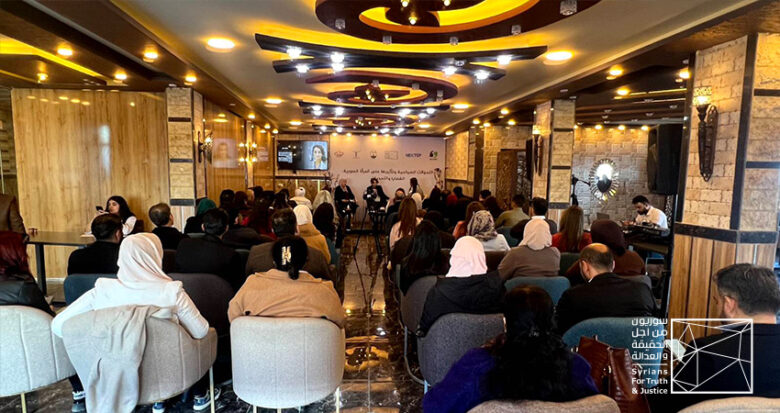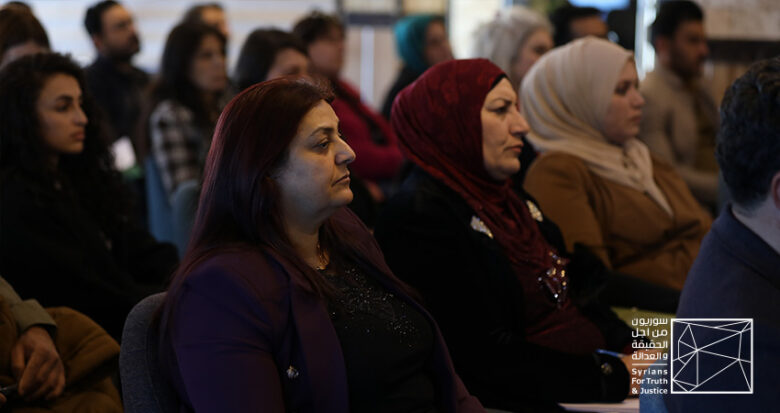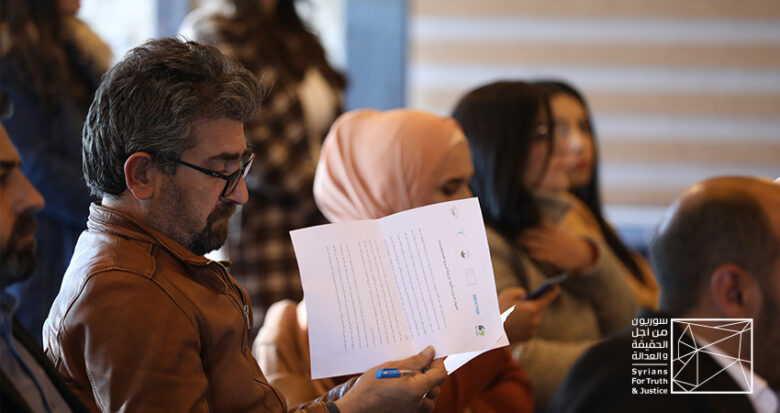On 7 March 2024, Syrians for Truth and Justice (STJ), in cooperation with Nextep Organization, Nextory Platform, Komela Şawîşka, Rose Organization, and Peace She-Leaders Network, organized a physical panel discussion in Qamishli/Qamishlo, northeast Syria, entitled “Political transformations and their impact on Syrian women” – in general and those in the areas of the Autonomous Administration of North and East Syria (AANES) in particular.
The session mainly focused on the political transformations that have taken place during years of conflict in Syria and how these changes have affected Syrian women. The discussions included an in-depth analysis of the Syrian constitution’s discriminatory laws from a gender perspective. The participants highlighted the Constitutional Committee’s work and vision of gender. Additionally, they examined the AANES’ Social Contract and how it relates to the Syrian women in northern Syria and discussed the challenges they face.
Local actors, activists, and media personalities attended the session. Sabah al-Hallaq, a member of the Constitutional Committee, was one of the speakers, along with Abeer Hassaf, a member of the mini-committee responsible for drafting the Social Contract of the AANES. Also present were writer and journalist Alan Hassan and Mona Abdel Salam, a feminist activist, and executive director of the Rose Organization.
 According to feminist writer and researcher Sabah Al-Hallaq, the Constitutional Committee in northeastern Syria lacks women’s representation, leading to a breach in the Committee’s work. Al-Hallaq noted the presence of a strong feminist movement and effective organizations in the region. She also highlighted the issue of the Syrian Constitution, which contains the word “Arabism” over 20 times in its preamble, which results in a lack of recognition of the diversity that exists in Syria’s various communities, including women. Al-Hallaq further criticized the discriminatory laws against women laid down in the Syrian Constitution and the Personal Status Law.
According to feminist writer and researcher Sabah Al-Hallaq, the Constitutional Committee in northeastern Syria lacks women’s representation, leading to a breach in the Committee’s work. Al-Hallaq noted the presence of a strong feminist movement and effective organizations in the region. She also highlighted the issue of the Syrian Constitution, which contains the word “Arabism” over 20 times in its preamble, which results in a lack of recognition of the diversity that exists in Syria’s various communities, including women. Al-Hallaq further criticized the discriminatory laws against women laid down in the Syrian Constitution and the Personal Status Law.
For her part, human rights activist Abeer Hassaf has pointed out that the Social Contract adopted by the AANES is a result of years of struggle by women in northeastern Syria. Through this contract, women were able to unite all women waging freedom from all the Syrian people components.
 According to Hassaf, the Social Contract is the most practical and reasonable document drafted with the local people’s consensus, regardless of the errors that may exist. She highlighted that the Contract has more than %50 representation of women of all social components and age groups.
According to Hassaf, the Social Contract is the most practical and reasonable document drafted with the local people’s consensus, regardless of the errors that may exist. She highlighted that the Contract has more than %50 representation of women of all social components and age groups.
Challenges Facing Women
Alan Hassan confirmed that civil society organizations that emerged in Syria after 2011 were established in unfavorable conditions. Many of these organizations focused on issues related to women. Although they lacked sufficient experience, the organizations were able to accomplish significant achievements in the field of women’s rights. Alan also emphasized that feminist civil society organizations should make use of opportunities and invest them wisely to raise awareness about women’s rights and support women’s issues. This can be achieved by increasing networking among women and with local authorities and activists in women’s issues, with the aim of addressing the root causes of problems related to women’s issues.
Mona Abdel Salam stressed that women’s issues are of utmost importance and must be given priority in all fields and sectors to achieve positive change and create a society where the values of equality and gender justice are prevalent. She also highlighted that the Kurdish women played a pioneering role in advancing women’s rights in northeastern Syria, especially since they were active in Kurdish political parties.
She suggested that the AANES should implement laws regarding women’s rights, clarify the complaint procedures, establish a connection between the role of women’s organizations and the judicial system, and educate society about women’s rights.

 The participants have formulated a set of recommendations,
The participants have formulated a set of recommendations,
- Imposing monitoring and tracking devices to ensure compliance with Social Contract laws in northeastern Syria.
- Exerting efforts to increase support and cooperation between women’s organizations and institutions in northeastern Syria.
- Advocating for the rights of displaced and forcibly displaced people and demanding their safe and voluntary return to their original areas of residence.
- Working to solve the water crisis in the city of al-Hasakah, preventing Türkiye from using water as a weapon of war, and sparing natural resources from the conflict.
- Collaborating with the community hosting female al-Hawl camp returnees and ensuring parallel support to the latter.

